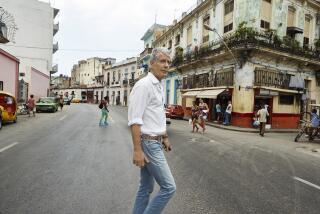Patricia Goedicke, 75, Poet and University of Montana Professor
Patricia Goedicke, a poet who wrote in bold, precise terms about romantic love as well as the stresses that illness and the specter of death impose on a marriage, has died. She was 75.
Goedicke died July 14 of pneumonia, a complication of cancer, at St. Patrick Hospital and Health Sciences Center in Missoula, Mont., according to Connie Poten, a friend.
Goedicke taught poetry at the University of Montana in Missoula for 25 years and was remembered as a beloved faculty member. She continued to teach a poetry workshop after she retired.
“Patricia wrote about traditional subjects -- emotion, sexuality, illness, death -- in ways that showed her strong feelings about all of life,” said Casey Charles, chairman of the school’s English department.
Critics referred to her writing style as both intensely emotional and intensely physical. Her poems were published in a number of literary magazines, including the Hudson Review, and collected in twelve published volumes.
She was awarded a National Endowment for the Arts fellowship, a Pushcart Prize and the H.G. Merriam Award for her contributions to literature in Montana.
Born Patricia McKenna in Boston on June 21, 1931, she graduated from Middlebury College in Vermont in 1953 and received a master’s degree in creative writing from Ohio University. She taught in the English department there for five years and married Victor Goedicke, a math and science professor at the university, in 1957. They divorced 12 years later.
She published “Between Oceans,” her first book of poems, in 1968 and was praised as a poet with “an unusual and startlingly original lyrical talent” by Publishers Weekly.
While an artist in residence at the MacDowell Colony in Peterborough, N.H., in 1968 she met Leonard Wallace Robinson, a poet and novelist. They soon married.
Some years later, the couple moved to San Miguel de Allende in Guanajuato, Mexico, where she taught creative writing at the Universidad de Guanajuato and wrote several books of poetry.
In her fifth book, “Crossing the Same River” (1980), Goedicke wrote about romantic love in its various phases from physical ecstasy with “Shooting stars and colored streamers/and 21-gun salutes,” to coexistence and eventually to a deeper bond.
Illness strengthened her marriage, she wrote in “Crossing the Same River.” She had developed breast cancer while living in Mexico. Poems in the book refer to illness but also to recovery and the “sweet steadfast cells of love/Forever replacing each other/and ringing.”
Goedicke and Robinson returned to the United States in 1981, when she was appointed as a visiting professor to the University of Montana. She was soon hired to a full-time position.
She completed “The Tongues We Speak; New and Selected Poems” in 1989. “Although not narrowly political, her works show an attentiveness to the world and where we are in history,” a New York Times review of the book noted in 1990.
In a statement about her work, Goedicke said she wrote poetry in part to acknowledge “the very idea of community.” In one poem, “For All the Sad Rain,” she referred to the violence that mars community life but also saw a positive side. “There is courage everywhere/For every reluctant nail biter,” she wrote.
One of her most personal collections of poems, “As the Earth Begins to End” (2000), describes her last months with Robinson. He died of a heart condition in 1999, after the couple had been married for 30 years.
Poems in the volume form “a portrait of marital love in twilight”, wrote a reviewer for the Wichita (Kansas) Eagle in January 2000. Goedicke “pulls no punches when confronting the wonder and misery of being alive,” the review said. The book was included among the top 10 poetry books of the year by the American Library Assn.
Goedicke wrote about the last tentative hours of any life and of what follows for the living, the “lamentation everyone must swallow/and can’t.... “
As a way of understanding death, she looked to the transcendent. The book’s title poem declares, “I’ve never been able to tell/ where we end and earth begins beyond us.”
Goedicke is survived by a sister and stepson.
More to Read
Sign up for our Book Club newsletter
Get the latest news, events and more from the Los Angeles Times Book Club, and help us get L.A. reading and talking.
You may occasionally receive promotional content from the Los Angeles Times.






